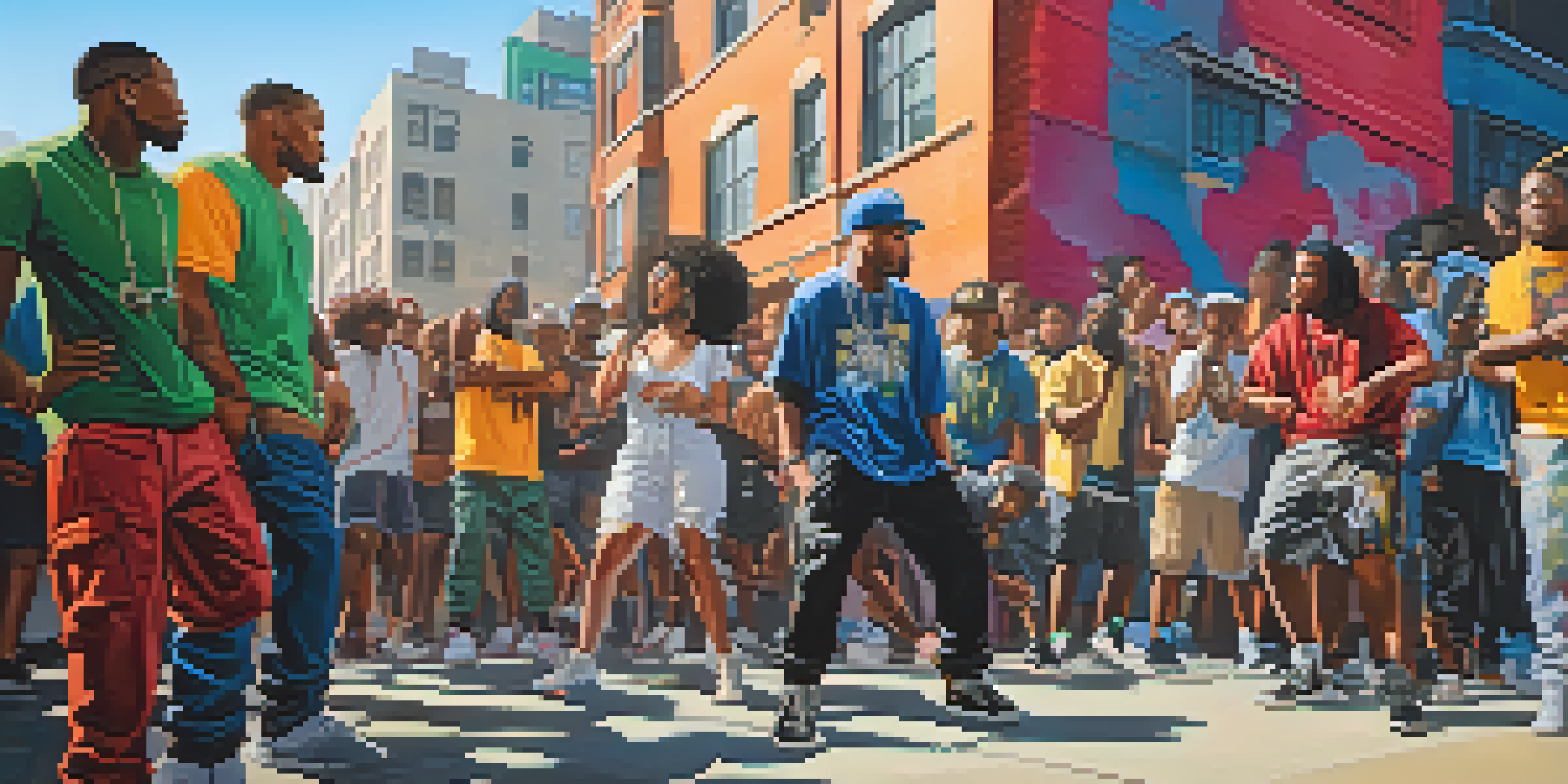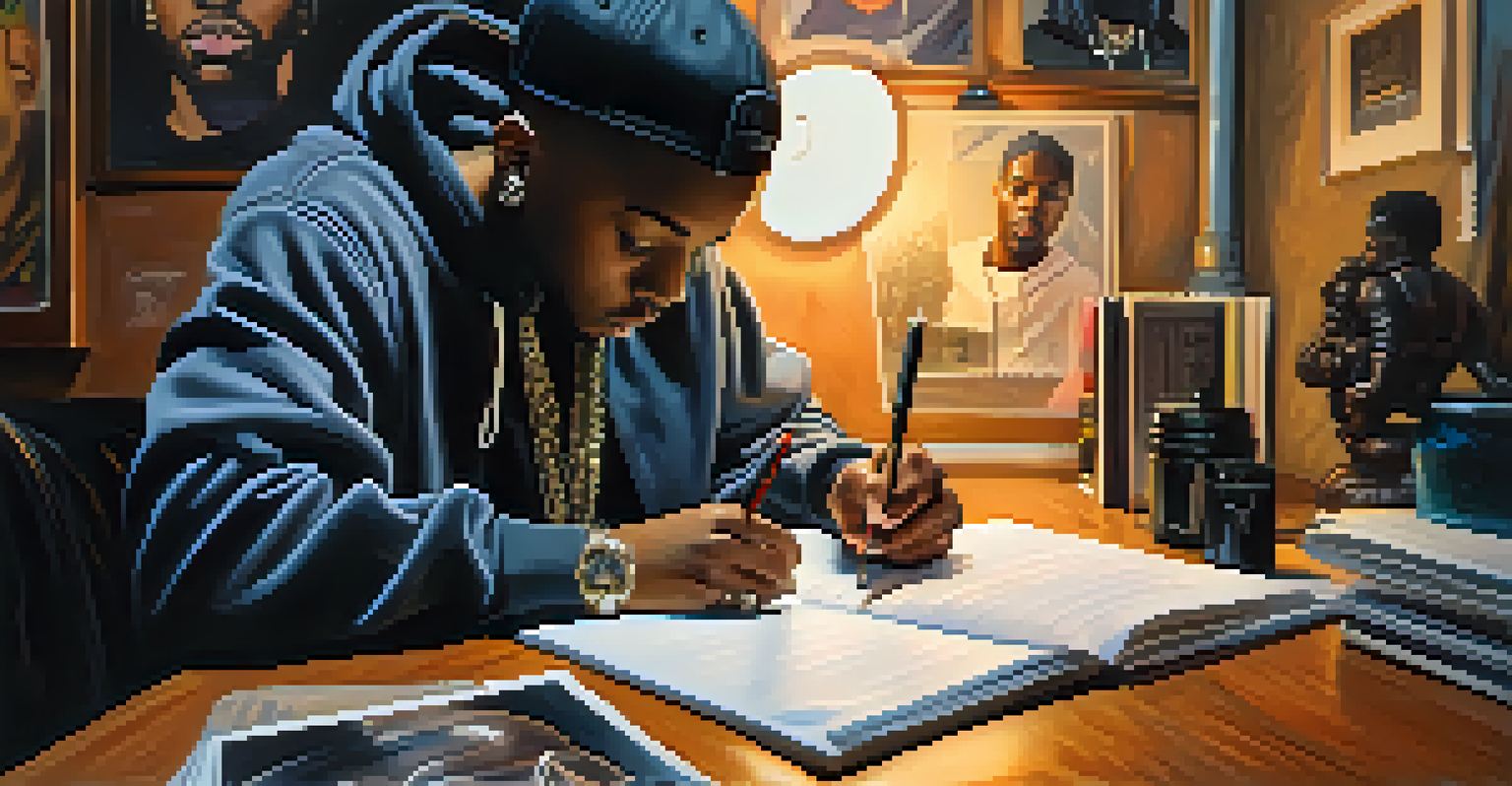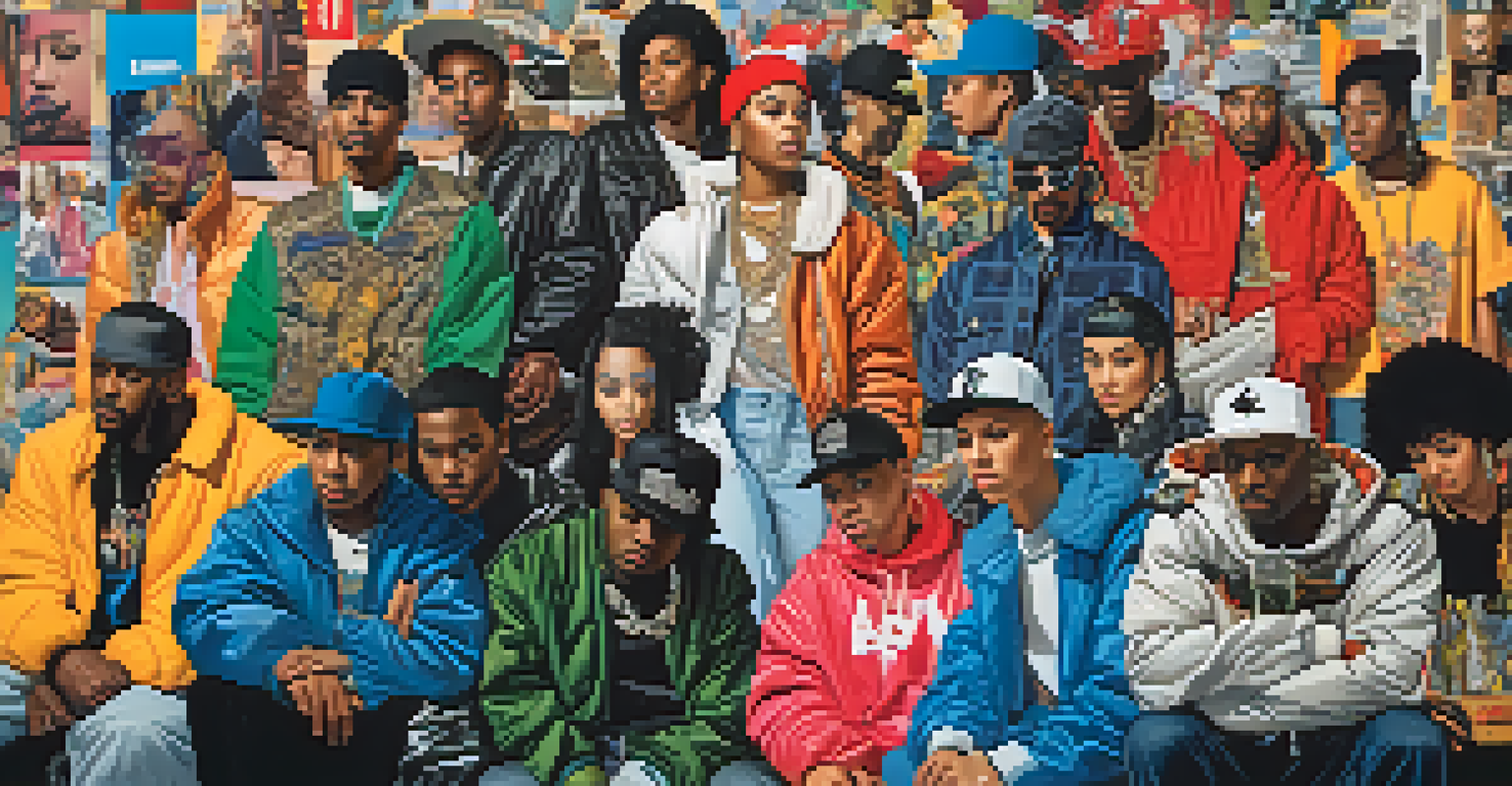The Influence of Hip-Hop Culture on Social Change

Hip-Hop as a Voice for Marginalized Communities
Hip-hop has long served as a powerful platform for marginalized voices. Artists share their lived experiences, shedding light on social injustices faced by their communities. Through storytelling in their lyrics, they connect with listeners on a profound level, making complex issues relatable and understandable.
Hip-hop has always been a voice for the voiceless, a platform for the marginalized to share their truths.
This connection fosters empathy and awareness, encouraging listeners to reflect on their own perspectives. For example, tracks like 'Fight the Power' by Public Enemy highlight systemic racism, prompting discussions that extend beyond the music. The genre's roots in African American culture further amplify its significance in advocating for equality and justice.
Ultimately, hip-hop acts as a mirror, reflecting societal woes while empowering individuals to take action. It invites listeners to not only witness injustice but to become advocates for change, reinforcing the idea that art can be a catalyst for social movement.
Lyricism as a Tool for Political Expression
The lyrical content of hip-hop is often infused with political commentary. Artists like Kendrick Lamar and J. Cole use their verses to address pressing social issues, from police brutality to economic disparity. Their music transcends entertainment, acting as a form of protest and a call to action.

For instance, Kendrick's 'Alright' became an anthem during the Black Lives Matter movement, resonating with those fighting against systemic oppression. Such songs empower listeners to unite and advocate for change, illustrating how music can inspire collective action.
Hip-Hop as a Catalyst for Change
Hip-hop serves as a powerful platform for marginalized communities to voice their struggles and advocate for social justice.
Moreover, the accessibility of hip-hop ensures that these messages reach a broad audience. With social media amplifying their reach, artists can engage with fans and mobilize them for activism, showing that hip-hop is more than just a genre—it's a movement.
Hip-Hop's Role in Community Organization
Beyond lyrics, hip-hop culture actively participates in community organization. Many artists leverage their platforms to support grassroots initiatives, demonstrating their commitment to social change. Events like community clean-ups, food drives, and educational workshops often emerge from the hip-hop community.
The power of hip-hop is its ability to transcend boundaries and inspire change across the globe.
For example, the initiative 'Hip-Hop for Change' focuses on using music as a vehicle for social awareness and community empowerment. By collaborating with local organizations, hip-hop artists can directly impact their communities, fostering a sense of unity and purpose.
This spirit of collaboration illustrates how hip-hop transcends entertainment, becoming a tool for community building. It inspires individuals to engage in local issues, reinforcing the idea that social change starts at the grassroots level.
Fashion and Hip-Hop: A Catalyst for Social Movements
Fashion and hip-hop are deeply intertwined, with style often reflecting cultural identity and social commentary. From oversized clothing to streetwear brands, hip-hop fashion serves as a visual expression of resistance and empowerment. The choices artists make in their fashion can challenge societal norms and promote inclusivity.
For instance, brands like FUBU and Rocawear were not just about clothing; they symbolized ownership and pride within the Black community. By wearing these brands, individuals assert their identities while advocating for representation in the fashion industry.
Global Influence of Hip-Hop Culture
The genre's universal appeal allows international artists to address local issues, connecting to the broader narrative of social change.
Moreover, artists often use their fashion choices to support social movements, bringing attention to important causes. This intersection of fashion and activism showcases how hip-hop culture can influence social norms and inspire broader societal change.
The Global Reach of Hip-Hop and Its Impact
Hip-hop's influence extends far beyond the United States, resonating globally in various cultures. International artists incorporate hip-hop elements into their music, addressing local social issues while connecting to the broader hip-hop narrative. This global reach demonstrates the genre's universal appeal as a form of protest and expression.
Take, for example, the rise of K-pop and its incorporation of hip-hop; artists like BTS use their platform to discuss mental health and societal pressures. This blending of genres illustrates how hip-hop can adapt and thrive in different cultural contexts, amplifying its message of social change.
As hip-hop continues to evolve worldwide, it remains a powerful tool for advocacy, fostering connections across borders. This cultural exchange strengthens the genre's role in promoting social justice and encouraging activism on a global scale.
Social Media: Amplifying Hip-Hop's Message
In the digital age, social media has become a vital tool for hip-hop artists to amplify their messages. Platforms like Twitter and Instagram allow artists to engage directly with their audiences, sharing their perspectives on social issues in real-time. This immediacy helps to mobilize support and raise awareness quickly.
For instance, artists often use hashtags to promote social causes, encouraging fans to participate in discussions and activism. The viral nature of social media can turn a single post into a global movement, as seen with campaigns like #BlackLivesMatter.
Social Media Amplifying Hip-Hop Voices
Digital platforms enable hip-hop artists to engage audiences directly, mobilizing support for social causes and fostering meaningful conversations.
Social media not only democratizes information but also empowers artists to take charge of their narratives. This shift allows them to transcend traditional media barriers, ensuring that their messages reach wider audiences and spark meaningful conversations.
Challenges within Hip-Hop Culture and Social Change
Despite its many contributions to social change, hip-hop culture faces challenges that can hinder its effectiveness. Issues like commercialization and the commodification of the genre can dilute its powerful messages. When profit becomes the primary focus, the original intent of advocacy can sometimes be overshadowed.
Moreover, certain narratives in hip-hop can perpetuate negative stereotypes, steering attention away from the movement for social justice. It's essential for artists and fans to critically engage with the content and promote messages that uplift and empower communities.

Addressing these challenges requires a collective effort within the hip-hop community. By prioritizing authentic storytelling and social responsibility, artists can continue to harness the power of hip-hop as a force for positive change.
The Future of Hip-Hop and Social Activism
As hip-hop continues to evolve, its impact on social activism is poised to grow even stronger. Emerging artists are increasingly using their platforms to advocate for change, addressing contemporary issues like climate change, mental health, and social justice. This new wave of hip-hop reflects the genre's adaptability and commitment to relevance.
Moreover, collaborations between artists, activists, and organizations are creating innovative ways to drive change. Initiatives that combine music, art, and community engagement are fostering a more inclusive approach to activism, expanding hip-hop's reach and impact.
Looking ahead, the future of hip-hop in social change is bright. With its roots in resistance and empowerment, the genre will likely continue to inspire future generations to challenge the status quo and fight for justice.